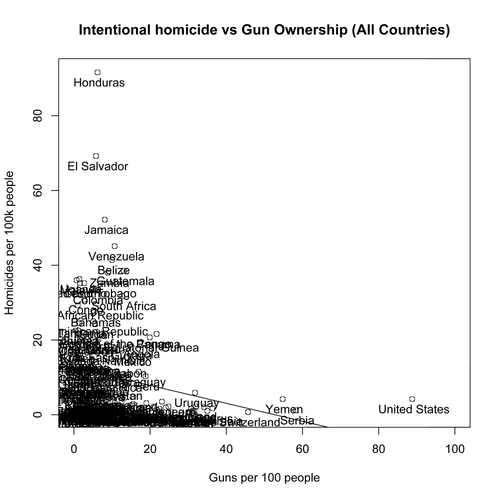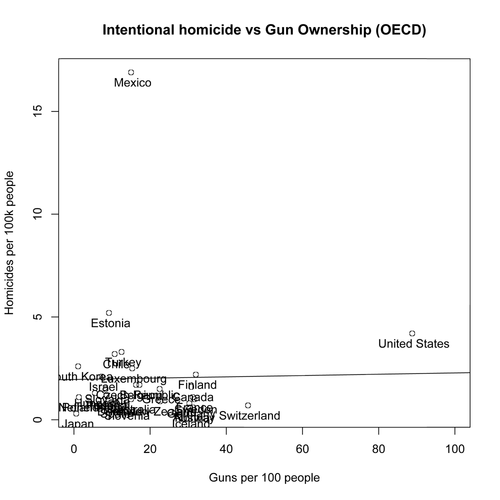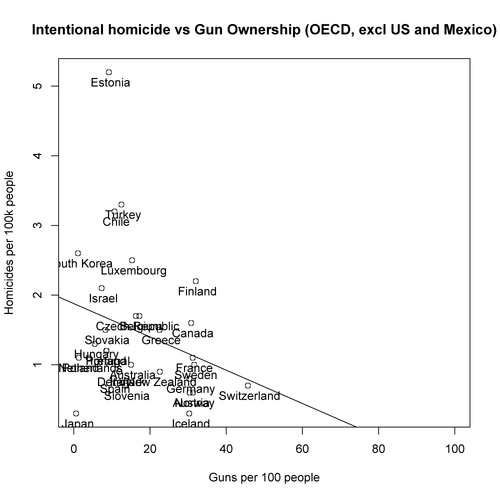After a school shooting in the US there’s outcry for the government to do something. Advocates of government action differ in the scale of the response they’d like to see, but many share the aim of having fewer guns in the hands of private people. The reforms are often presented as ‘common sense’ measures, as if it’s obvious that they would significantly improve matters. I hope to show why that’s not the case.
The statistics
Given the cultural, economic, political differences between countries, international comparisons of violence and gun ownership are of very limited use. Even so, many are again making the claim that international data regarding gun ownership and violence supports the case for more restrictive gun prohibition. Even if trends in the data were capable of supporting such a conclusion, it doesn’t appear to be the case. The plot below compares homicide rate against gun ownership rate.

When all countries are plotted, there’s a negative correlation between gun ownership and homicide rate. Only when the plot is limited to OECD countries (with the outliers of US and Mexico included), does a very small positive correlation appear.

And if those outliers are removed, the trend is strongly negative again.

The total homicide rate is more relevant that the gun homicide rate
Why do the plots use overall homicide rate? Because we should be interested in the total effect that gun ownership might have. For example: Easy access to a firearm may be the dispositive factor that leads the marginal killer (the person who very nearly didn’t kill, and if things had been slightly different, wouldn’t have) to commit a crime — increasing the homicide rate. But firearms are also used defensively, and the suspicion that a victim may be armed is a powerful deterrent for attackers — in these ways guns decrease the homicide rate.
Hypotheticals
To put it another way: Imagine that one legally owned gun is added to a population and that this coincides with a small increase in gun related deaths but a huge reduction in overall killings. The gun would be improving conditions in that population, while a narrow focus on gun death statistics would misleadingly paint the opposite picture.
Or imagine that a country banned all private gun ownership. Gun ownership dropped to zero. But emboldened criminals began carrying out deadly knife attacks at a far greater rate than before. Gun homicides were now at zero, but total homicides had risen by 400%. Things have gotten much worse, and if we only look at gun deaths, we’re overlooking that entirely.
So we want the metric we use to be able to capture the potential ways that gun ownership makes things better as well as worse. Total homicides is the more relevant figure to use.
Opposing tendencies
We’ll ignore international statistics now, and just reflect on what we know about how people behave. Would more restrictive government prohibition of guns in the US make things better or worse with regard to the killing of innocent people? We don’t know.
There are some outcomes of gun prohibition that we can predict with a fair degree of confidence. But some of these outcomes will increase overall killings, and others will decrease them. We don’t know which tendency would prevail.
In favour of more restrictive prohibition of guns we can point to likely outcomes that would give a reduction in the rate and severity of harm to innocents. These outcomes include:
- Fewer gun accidents.
- Fewer deadly crimes of passion.
- The marginal killer may find it harder to obtain a gun, which could save lives.
Against the prohibition of guns, there are outcomes that would give an increase in the rate and severity of harm to innocents. The outcomes include:
- At any time, there will be a higher proportion of law-breaking aggressors with guns, relative to law-abiding people with guns, than if guns were more widely available legally.
- Because of 1, anyone considering carrying out an armed attack would be less worried about being injured or killed while doing so. They would be emboldened, and so more likely to carry out such an attack.
- Because of 1, any mass shooting which does occur is likely to last longer and harm or kill more people, since there’s less likely to be a person on the scene with a firearm who could stop the shooter.
- In an area in which many people demand guns (such as the US), prohibition will result in a boom in black market guns, and an associated increase in violent gang activity both domestically and abroad. If the government declares a ‘War on guns’ in response, we should expect it to be a similar failure as the ‘War on drugs’ is. Just like the ‘War on drugs’, a ‘War on guns’ will result in the loss of many innocent lives.
- Gun prohibition creates a greater likelihood of democide. Which, in the 20th century claimed many times more lives than were ended by ‘private’ murders. Most democides are carried out against members of populations that have been legally disarmed beforehand.
The meds
The perpetrators of school shootings, the kind of murder that most reliably makes the headlines, are very often taking medications known to lead to murderous psychotic episodes in a minority of people. At the scale at which these drugs are prescribed in the US, it’s not surprising that school shootings happen as often as they do.
Perhaps the activists hoping to change the world for the better might spend their energies more effectively by directing their attention to medication practices, and the incentives of pharmaceutical companies in the US.
Read more? All articles
I create videos with the help of my patrons great and small.
Find out more about supporting my work.
Would you like to get emails now and then when I publish new things? Leave your address here.
